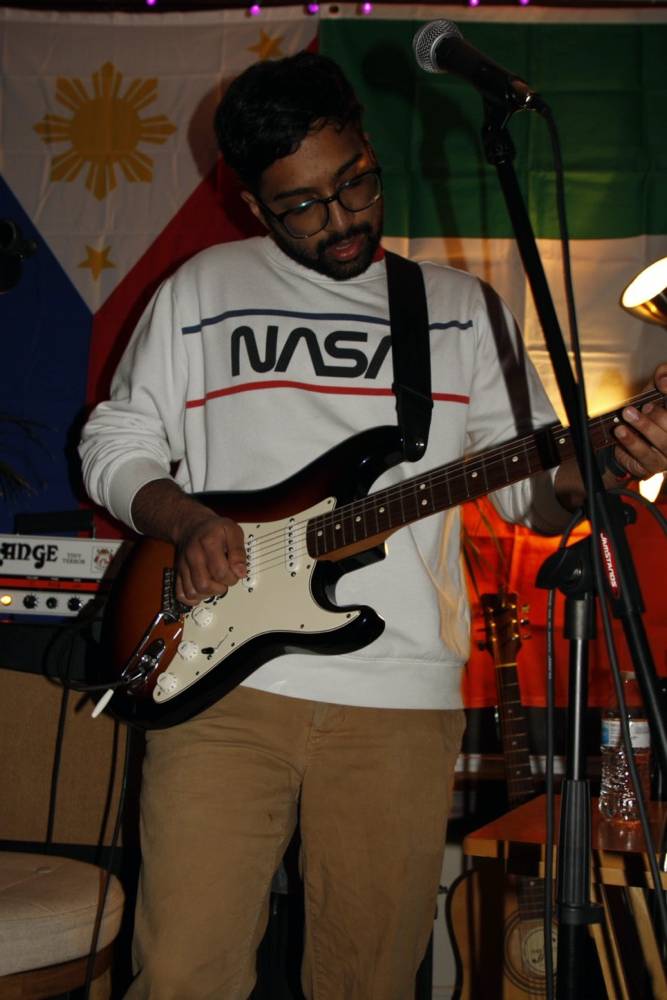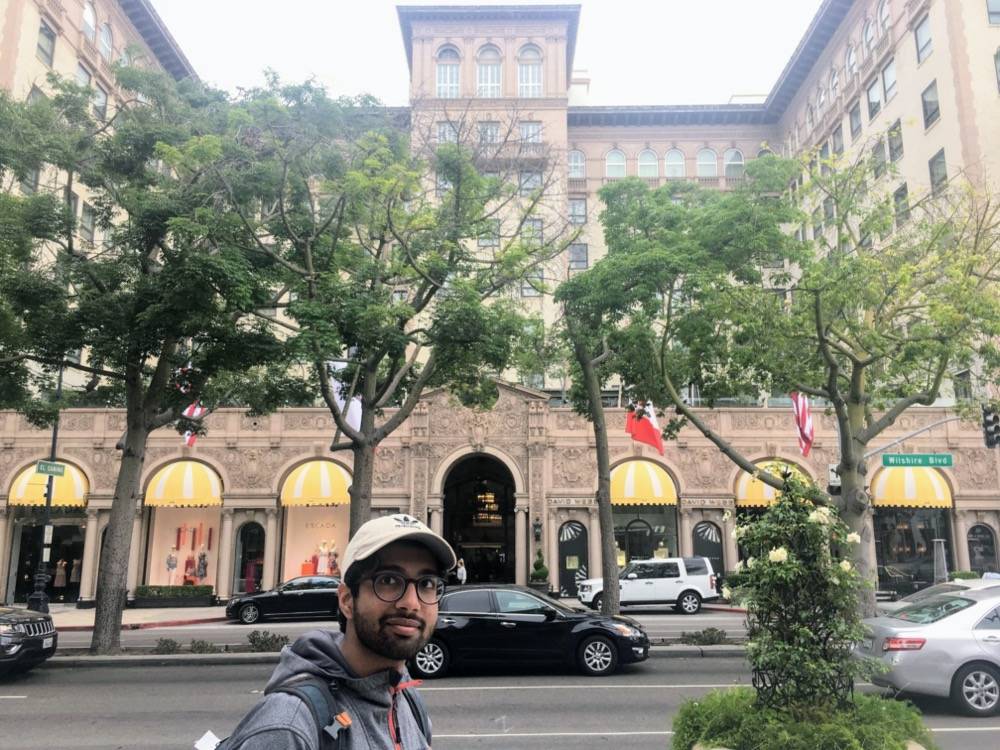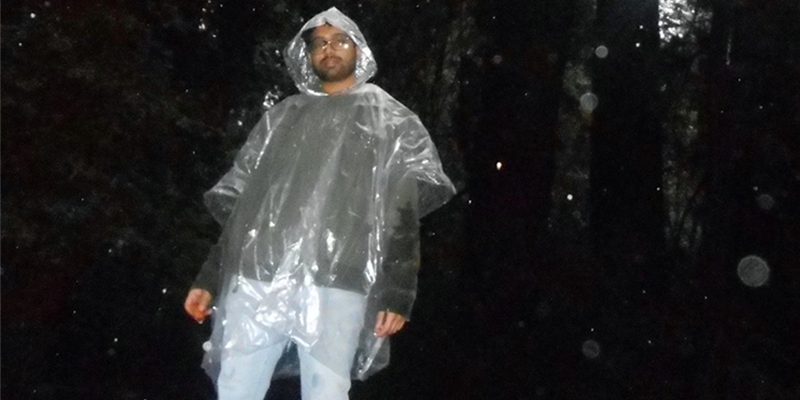Aditya Kashyap has progressed steadily as a musician since diving into the music program as a student at Neuqua Valley High School in Naperville. He’s played classic, jazz, funk, rock and indie music, and he’s been the frontman, guitarist and bassist for a few bands over the last several years.
In the summer of 2016, just before he began his freshman year at the University of Illinois, Kashyap played at the House of Blues with his band Something To Live By. He’s toured the Midwest and played at PYGMALION with The Data Waves, an instrumental funk group for whom he is the bassist. But it took Kashyap until last summer to realize he wanted to venture out with his own solo work.
Working with friend and Data Waves drummer Shravan Raghuram, the duo hit a different groove, moving away from funk and toward rock. It flowed effortlessly for Kashyap, who was eager to explore new territory as a musician.
“We started working on some songs and they ended up being really ‘90s inspired, Nirvana sounding rock songs and dramas,” Kashyap said. “I kind of blown away. Shravan was like, ‘how are you able to just like play these rock songs without thinking about it and just make it so quickly?’”
Ultimately, those summer sessions propelled Kashyap to launch a solo effort that was more true to the sounds he grew up on. He came up with Onyx’s opening track “Day After Day” from the jump.
“We ended up putting the demo that would become day after day, which was the title track on the album. We ended up making that demo and maybe 30 minutes to an hour. And he just looked at me and was like, ‘how did you come up with that so fast?’ I’m like, ‘well, it’s just like, what I’ve done for so long, it just comes to me like that.’”
The project whizzes by in a blissful, but brief 26 minutes, spanning seven tracks that have elements reminiscent of a number of groups Kashyap jammed to as a kid. He drew influence from the likes of Red Hot Chili Peppers, The Smashing Pumpkins, and Sonic Youth, while crafting his own themes with his lyrics.
“The bands that I first heard that forced me to pick up the guitar in the first place, this is sort of like my way of giving back to that and recognizing that,” Kashyap said. “Rather than digging through all the influences that have been a part of my life up to this point, this is sort of me just looking back on how it all started and bringing it all together.”
It’s his own take on the alternative rock staples of the ‘90s and the warped riffs of shoegaze.
“It’s just a lot of distorted, loud guitars, a lot of guitar pedals that basically define this really loud form of rock music,” Kashyap explained. “I think that was the goal. I mean, that’s what I’ve always known for years.”

Photo by Matthew Waldinger.
Raghuram helped with songwriting throughout the record’s production, and Kashyap, not wanting to force himself down a path without certainty, took his time as his senior year began last fall, eventually recording the bulk of the project in December.
Kashyap actually composed roughly 25 songs before he shaved the project down into a compact selection he felt offered the most natural, cohesive combination of material. On “Day After Day”, which opens with an infectious guitar melody, Kashyap weaves imagery that forms a fitting soundtrack to the isolated lifestlye many have taken up under the stay-at-home order. He muses, “no surprises for you and me, I know you get just what you see, as long as we can get our way there’s a reason day after day.”
He hits more introspective form on tracks like “What I Wish I Heard” and “Passing Me By”, where he reflects on his past and about some of the irreversibles in life, noting that “what you say is not permanent, every day is getting shorter and every day you’re getting older.”
It wasn’t planned this way, but Kashyap ended up dropping Onyx a couple of weeks after the pandemic had the area in its grip, after in-person classes had been canceled and the majority of the student population left campus. He admitted that he would have preferred to be able to roll out the project with a build-up of shows on campus and in the area, but instead has had to rely on word of mouth and social media to promote its release.
The pandemic has given Kashyap more time to think about how he wants to present his project in a live setting though, whenever that may be. He’ll have to find the right musicians to play with him, but Kashyap is also wary of impeding on fellow musicians’ individuality.
He is set to finish his degree at Illinois this spring in biological engineering, but Kashyap knows he will continue to make music as he continues throughout life.
“I think music is just the way I process the world,” Kashyap said.

Photo by Aditya Kashyap.
Before he released the project, Kashyap got in touch with Los Angeles-based bassist Emily Retsas, who plays with Sonic Youth’s Kim Gordon.
Retsas, who is originally from Australia, spoke with Kashyap about music, the industry and experiences playing in different groups for about an hour over Zoom last month. Her openness and support encouraged Kashyap, but he also noted he was encouraged by something he saw from British group Wolf Alice. Regardless of his nerves or how others would perceive him, he should simply move forward with what was important.
“It’s not that big of a deal to just do whatever you want,” Kashyap said. “Wolf Alice had a great piece of advice. They’re talking about, ‘should I make pop music? Should I make indie music? Should I make garage rock?’ Everyone has all of these in them, everyone likes a lot of different kinds of music.”
After learning through doing, Kashyap offers similar advice for artists and creatives who are teetering on the edge of action: Don’t expect too much, set parameters in accordance with a vision for projects and work gradually. Putting loads of pressure on won’t result in a natural product.
“You have to know what your constraints are,” Kashyap said. “That way you know what you can work with, and the same thing applies to any creative thing. If you have every option in the world in front of you to work with, you’ll just be overwhelmed.”
“I did a lot of the guitars, really cool chords, really simple songs,” Kashyap continued. “Not a lot of lyrics. A lot of the songs, I would just write like a section of it or just a guitar part in a day, or just a couple of lyrics. Doing that continuously over a long period of time, it adds up. So don’t let yourself be overwhelmed and sometimes less is more.”








